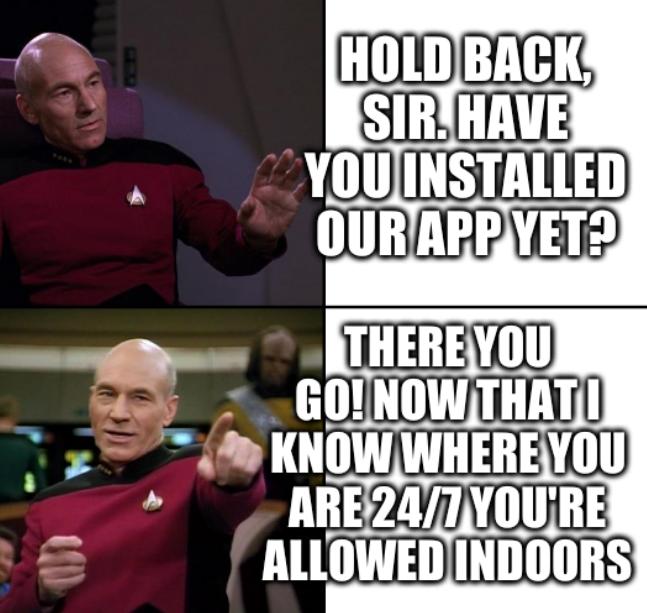

Tech rights, or rights associated with use of technology (e.g. the right to modify code, right to share programs, privacy rights etc.) are going away. COVID-19 further accelerated this trend, even for home workers (spyware is becoming more common inside one's own home, by demand from one's boss/es).
"So-called 'phones' track not only one's location but also who one meets or walks next to (or talks to, maybe complete with a recording!), so we know we're moving in the wrong direction."The regressions are very noteworthy and they're happening faster than one can properly analyse/assess them, let alone resist them. So-called 'phones' track not only one's location but also who one meets or walks next to (or talks to, maybe complete with a recording!), so we know we're moving in the wrong direction. 5 days ago I went to a shop that sells so-called 'phones'; they told me that since late 2018 they've refused all cash payments; this means that even PAYG contracts for so-called 'phones' (even 'dumb' ones) aren't possible without giving away one's identity. Not anymore.

"Surveillance or data-hungry cults will of course promise us solutions -- ones that involve massive compromises that bring about no real solutions."A few months ago DD Erich Schubert published "Contact Tracing Apps are Useless". It's one of the better posts about this subject. To quote some bits: "Some people believe that automatic contact tracing apps will help contain the Coronavirus epidemic. They won’t. Sorry to bring the bad news, but IT and mobile phones and artificial intelligence will not solve every problem."
"In my opinion," he wrote, "those that promise to solve these things with artificial intelligence / mobile phones / apps / your-favorite-buzzword are at least overly optimistic and “blinder Aktionismus” (*), if not naive, detachted from reality, or fraudsters that just want to get some funding."
He gave almost a dozen different reasons. Among them: "Low adoption rates. Apparently even in technology affine Singapore, fewer than 20% of people installed the app. That does not even mean they use it regularly. In Austria, the number is apparently below 5%, and people complain that it does not detect contact… But in order for this approach to work, you will need Chinese-style mass surveillance that literally puts you in prison if you do not install the app."
On "Trust" he said: "In Germany, the app will be operated by T-Systems and SAP. Not exactly two companies that have a lot of fans… SAP seems to be one of the most hated software around. Neither company is known for caring about privacy much, but they are prototypical for “business first”. Its trust the cat to keep the cream. Yes, I know they want to make it open-source. But likely only the client, and you will still have to trust that the binary in the app stores is actually built from this source code, and not from a modified copy. As long as the name T-Systems and SAP are associated to the app, people will not trust it. Plus, we all know that the app will be bad, given the reputation of these companies at making horrible software systems…"
"Hours ago Britain said masks would become obligatory inside stores (effective 10 days from now), which is actually quite reasonable and not privacy-infringing. If anything, masked people are more difficult to track from cameras (with or without human labour to assess the footage)."Lastly he noted that "Iceleand, probably the country that handled the Corona crisis best (they issued a travel advisory against Austria, when they were still happily spreading the virus at apres-ski; they massively tested, and got the infections down to almost zero within 6 weeks), has been experimenting with such an app. Iceland as a fairly close community managed to have almost 40% of people install their app. So did it help? No: “The technology is more or less … I wouldn’t say useless […] it wasn’t a game changer for us.”"
Surveillance or data-hungry cults will of course promise us solutions -- ones that involve massive compromises that bring about no real solutions. We hope to publish more to that effect in weeks to come. Hours ago Britain said masks would become obligatory inside stores (effective 10 days from now), which is actually quite reasonable and not privacy-infringing. If anything, masked people are more difficult to track from cameras (with or without human labour to assess the footage). I'm all in favour; the liberty lost by enhancing collective health is a lot less than the liberty lost to face recognition.
For those who think privacy does not matter much anyway, do read this article from figosdev. ⬆
Comments
Canta
2020-07-15 18:21:03
Another thing growing on here, since decades now, is IT industry. We have free/gratis public education, including free/gratis public universities, which gives us an overall well-formed labor force. That's fertile ground for IT.
At the same time, IT labor force is usually linked to strong USA cultural influence, and so there's a notable cultural and political gap between IT workers (usually young middle-class white males) with almost everyone else (usually not-so-young, not-so-middle-class, not-so-white, and not-so-males).
LATAM in general, and Argentina in particular, has a long history of resistance against USA influcence (and Europe before that). We have very strong political movements rooted in that history. But IT culture is both, outside that history so far, and coming from outside LATAM.
What we also have is national debt. After Plan Condor's (see https://en.wikipedia.org/wiki/Operation_Condor) relative failure and granted unsustainability, the international financial debt became the means for controlling us. And given this is international debt, we need US Dollars to pay it, which we don't generate but by trading with other, richer countries. And while in debt, we can't grow. Enters IT as a shiny golden ray of hope for our economy and future development.
Then the covid crisis came. We have a highly successful quarantine, both in practical terms and in public oppinion. But months of quarintine are hard to sustain too, and people also demands for a way to lift it.
So... goverment app came into the scene, and both you and me know the drill and have lots of things to say. But it was mostly cheered by everyone. We have now a big front of historial and well organized political movements, very well formed in politics and cultural debate, but poorly formed in IT, which sees the app and the IT as a way to fix things in the country and (more importantly) aliviate people's pain; and on the other side we have a younger mass of well educated IT professionals, with very poor political and cultural education and no history at all, cheering for "technological progress", which may be very happy with an app but just don't want the state handling it.
This young IT people hates the state for the wrong reasons, and everyone else loves the app and IT field for the wrong reasons too. Of course they're not "wrong" in an objective sense, but just from my ideological perspective. Yet, I was hoping this tale showed how this issue is in fact very, VERY complex, and we should be prepared to deal seriously with lots of crazy debates in the next years.